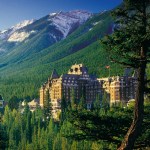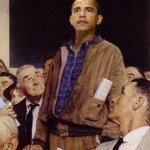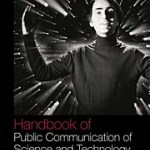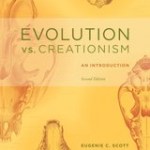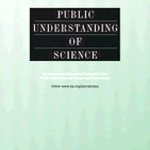Science communication research
Earlier this month, the Robert Wood Johnson Foundation officially announced its 2009 Investigator Awards in Health Policy Research. Ten projects involving sixteen scholars from the country's top research universities were recipients of grants up to $335,000. For more on the program and awards, see this announcement. An abstract of our funded project on climate change communication is posted below.
Our research, in fact, is already well under way. This summer, with the help of several top class graduate students, we completed hour-long interviews with 70 Americans recruited from among 6…
I am in Banff this week participating in a fascinating workshop on the scientific, clinical, ethical, and communication issues related to personalized medicine and genomics. A special issue of the journal Public Health Genomics (formerly Community Genetics) will focus on the themes covered at the workshop. I will be contributing a review article on research and issues related to the media and public engagement. Early access publication of the articles should occur in the spring.
On a related topic, earlier this week, the Columbia Journalism Review posted a commentary that I co-authored…
Over at the Columbia Journalism Review, Curtis Brainard previews some of the major themes and proposed initiatives from a new co-authored paper I have appearing at the American Journal of Botany. The article is scheduled for the October issue as part of a special symposium on science education and communication. A pre-publication author proof is available with the final paper online later this month. If you have been following the recent blog debates over science communication but have been looking for more substantive sources, this paper is probably for you. It's also a good introduction to…
For DC-area readers who have been following the discussion of climate change communication at this blog, you will want to turn out to Ed Maibach's talk tomorrow at the NSF. Details below. For background reading, see Ed's report with colleagues on Global Warming's Six Americas and the resources at the Center for Climate Change Communication, which he directs. I would also recommend his recent co-authored article from the American Journal of Preventative Medicine. Ed and I are collaborating on a funded project to test different frames on climate change across audience segments, evaluating the…
As I wrote last week, deliberative forums and town hall-type meetings are one of the major innovations in science communication and engagement. Whether forums are focused on climate change or nanotechnology, research shows a range of positive outcomes both for lay participants and organizers of these initiatives. Yet as Kirby Goidel and I document in a study published at the journal Political Behavior, somewhat predictably, the individuals most likely to turn out and voice their opinion at a local deliberative forum on a science-related debate are also those individuals who have the most…
Last week I pointed to two edited books released in 2008 that do an outstanding job of synthesizing the relevant issues and research on science communication and public engagement. Here are two more: From Oxford University Press there is a companion set of edited volumes that cover themes related to science communication research and practice respectively. Both books are worth checking out and owning for people working in the academic field or for scientists and communication professionals.
Holliman, R., Thomas, J., Smidt, Scanlon, E., & Whitelegg, E. (Eds.) 2008). Investigating Science…
Last week I participated in a two-day workshop at NSF on climate change education. The meeting brought together researchers in science education, communication, and informal learning; representatives from government agencies such as NOAA, the EPA, and NASA; and organizations such as the American Geophysical Union and the American Meteorological Society. The presentations and discussions focused not only on school-based settings but also on public engagement campaigns, the news media, and the role of science centers and museums.
Among several participants, there was an emphasis on three…
I recently received copies of two relatively new edited volumes on science communication and public engagement. The volumes include research and perspectives from an interdisciplinary collection of mostly European scholars. I am preparing a review essay on these books for the journal Political Communication, drawing connections to research on policy debates, communication influences, and citizen engagement generally. I will post a draft of this review when complete. In the meantime, these twin volumes are strongly recommended, and are perhaps the best introduction to the major issues in…
As I noted when the Pew science survey was released last month, there was a disturbing tendency among some bloggers and commentators to seize upon the findings as yet more evidence of a "dangerous divide," a "widening disconnect," and a "gulf" between scientists and the public. I summarized some of the problems with this narrative at the time as did others.
In a follow up article at The Scientist titled "Are Scientists Really Out of Touch?," several researchers who have conducted similar surveys of scientists and the public have noted their own reservations about the "dangerous divide" claims…
About 400 people packed the classic AFI Theater last night for the NIH-sponsored screening and discussion of Inherit the Wind. Here are a few follow-up notes, especially for attendees logging on looking for more information about topics discussed.
1. As I mentioned last night, perhaps the best book on understanding the science, the history, and the politics of America's decades long debate over evolution is Eugenie Scott's Evolution vs. Creationism, recently updated, expanded, and released in its 2nd edition.
2. For those looking for more details on the issues related to framing and public…
As I noted last week, the Pew survey of scientists finds that more than 50% self-identify as liberals compared to just 20% of the public.
Which then leads to the question: what role does ideology play in shaping scientists' policy preferences relative to science, especially in those areas outside of their specialty? Or on those issues where there are high levels of uncertainty about risks, benefits, and trade-offs? Heuristic decision-making is common in politics and policymaking, are scientists as a group any different?
Put another way, in responding to the Pew findings, several commentators…
Over at the liberal blog site Daily Kos, the anonymous "Dark Syde" reviews the book Unscientific America. The review, unfortunately, echoes the all-too-common "fall from grace narrative" about the place of science in American society, a distracting if not harmful myth that we discuss in a forthcoming journal article and that I noted Friday.
All the trademark "fall from grace" metaphors, catchphrases, and references are included in the Daily Kos review including claims about a rise in "anti-science," "know-nothingness," open contempt for science, and a "long national slide into pseudoscience…
Over at MIT's Knight Science Journalism Tracker, the wise Charlie Petit has a great round-up of coverage of yesterday's Pew science survey. On what I described earlier today as a troubling "fall from grace" narrative in some reporting and commentary, Petit points to the obvious difficulties science reporters might have in covering an issue they deeply care about:
One notes that bylines [in coverge] tend to belong to science writers. Science writers can hope to cover science itself with a semblance of objective dispassion. But they have an inbuilt conflict of interest when the topic is the…
Somewhat predictably, several pundits and commentators have framed Thursday's Pew survey as supporting an all too common yet misleading "fall from grace" narrative about the place of science in society.
These interpretations proclaim a "growing disconnect," "a dangerous divide," a "widening gulf" and use other metaphors that are representative of what sociologists might label as a moral panic. This traditional fall from grace narrative about science argues for the need to return to a (fictional) point in the past where science was better understood and appreciated by the public. In the U.S…
[UPDATE: See this follow up on media reaction to the report.]
The Pew Research Center released today a major new survey report documenting Americans' views of science and technology and comparing these lay perceptions to a representative sample of U.S. scientists who are members of AAAS.
As part of a panel of experts, I had the chance to contribute input and ideas on the survey earlier this year. I have been eagerly looking forward to the findings ever since. Below I have jotted down a few key implications that come to mind on my first scan.
I will have more to say next week and probably…
Our recent article at Nature Biotechnology (PDF, news release) has generated attention Down Under, with coverage appearing at the Australian Broadcasting Service and The Australian newspaper.
Both outlets do a good job of reporting on the central themes of the article, especially The Australian, which leads with a focus on the "miserly" nature of audiences, a reality that always seems to captivate journalists. Of course, there are also the traditional reservations voiced.
In a forthcoming article at the American Journal of Botany, my colleague Dietram Scheufele and I address these common…
In the latest issue of the journal Public Understanding of Science, Lorraine Whitmarsh from the Tyndall Centre for Climate Change Research in the UK, publishes a study that finds that the terms "climate change" versus "global warming" matter to public perceptions. In a mail survey of a representative sample of 590 residents from the Portsmouth, UK region, Whitmarsh gave half the participants a questionnaire asking them to evaluate the risks and impacts of "climate change" and the other half of the sample a questionnaire asking them to evaluate the risks and impacts of "global warming."
From…
I am in beautiful Madison, Wisconsin today to give this lecture at 7pm on campus. The talk is free and open to the public.
MIT Knight Science Journalism Tracker has posted a PDF version of the Nature Biotechnology article. Previously, the article has only been available to readers with an institutional subscription. See also the news release.
Next week on Thursday, June 25 I will be visiting one of my favorite cities Madison, Wisconsin to give a lecture titled "What's Next for Science Communication?" It's part of a summer speaker series sponsored by the Dept. of Life Sciences Communication and the Holtz Center on Science and Technology Studies at the University of Wisconsin.
If you are interested in the themes discussed in last week's article at Nature Biotechnology, then you will definitely want to come out to the presentation. If you can't make it, online video will be available and Wisconsin Public Television will be re-…
